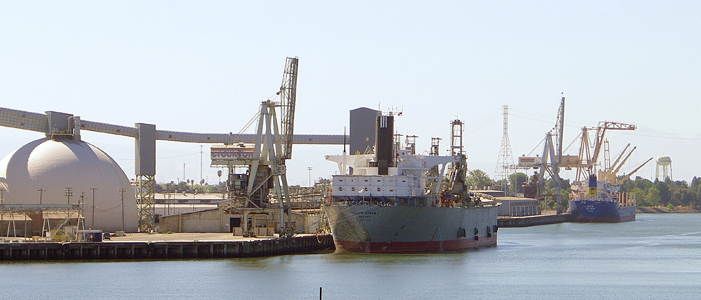Most of the time, we see the Delta as a peaceful playground where we escape from the daily drudge of our lives. However, there are those who live and work on the river.

The Port of Stockton is a major inland deep water port located on the San Joaquin River and covering 2,000 acres of operating real estate.
Photo by Jah Mackey
By Jah Mackey
Published: October, 2010
Most of the time, we see the Delta as a peaceful playground where we escape from the daily drudge of our lives. However, there are those who live and work on the river. Do they escape their daily drudge by going to the big city? Intrigued, I set out to survey some of the businesses operating in the Delta—this month, I’ll examine activities at the Ports of Stockton and Sacramento.
The Port of Stockton is a major inland deep water port located on the San Joaquin River and covering 2,000 acres of operating real estate. Included is over 7.7 million square feet of covered warehouse space, 50 miles of railroad track and more than two miles of dockage. The Port occupies an island in the San Joaquin Delta and a portion of a neighborhood known as Boggs Tract.
The Port is home to over 117 businesses representing nearly as many industries. Nestled in the hub of four major freeways, two transcontinental railroads, an international waterway and a regional airport, the Port of Stockton is centrally located to provide optimum service for shipment and storage of product and cargo.
As I left the Port of Stockton, I was extremely grateful for the opportunity to view the completed renovations first-hand thanks in part to the wonderful work of the Stockton Redevelopment Agency. I then turned my attention upriver as I made my way to the Port of Sacramento.
The Port of Sacramento, also known as the Port of West Sacramento, is an inland port located 79 nautical miles northeast of San Francisco. Cargo ships access the Port of Sacramento through San Francisco Bay, then passage up the Sacramento River and through the Sacramento deep water channel.
The Port of Sacramento is used in part for the export of bagged and bulk rice. Construction materials such as cement, lumber and fertilizer also make up a great deal of the Port’s cargo volume, as does large project cargo such as wind power generation equipment.
The Port of Sacramento is now owned by the city of West Sacramento, which has planned projects to expand the services of the port. Expansion services include two new cement terminals, a waste wood conversion facility, a recycling plant and other projects that will bring permanent jobs to the area. Also announced is an agreement with Primafuel for the planned construction of a state-of-the-art biodiesel manufacturing facility. The project is partially funded by the California Air Resources Board, and is consistent with the Port’s plans for green growth and would receive cargo materials including biofuels, vegetable oils and other safe materials via marine transport and rail.
To make all of these changes possible and enable increased commercial traffic to the port, some infrastructure improvements have become necessary. So the port and the Army Corp of Engineers have joined forces on a project that will deepen the Sacramento River Deep Water Channel (SRDWSC) and improve aids to navigation on the Sacramento River.
The SRDWSC is a 46.5-mile long ship channel that lies within Contra Costa, Solano, Sacramento, and Yolo Counties and serves the marine terminal facilities at the Port of Sacramento. The SRDWSC joins the existing 35-feet deep channel at New York Slough, thereby affording the Port of Sacramento access to San Francisco Bay Area harbors and the Pacific Ocean. The channel deepening project was funded by the federal government for $957,000 in fiscal year 2009. The Port has been successful in obtaining a commitment from the California Transportation Commission for $10 million to use as our local share for the deepening project.
In the end, while we may see the Delta as our Shangri-La to escape the drudge and tediousness of our lives, many find its shores and temperate climates the perfect place to earn a living. Stay tuned for next month’s issue as we take a more in-depth look at the marine transportation companies and their clients that call these ports home.
Jah Mackey, is President of Oceanus Marine Group (OMG), which provides outsourced marina management services to public and private marinas. Mackey is the current commodore of California’s first internet-based yacht club, OMG’s Delta Yacht Registry, and is an avid boater with over 20 years of boating experience on the San Francisco Bay and Delta Regions.


